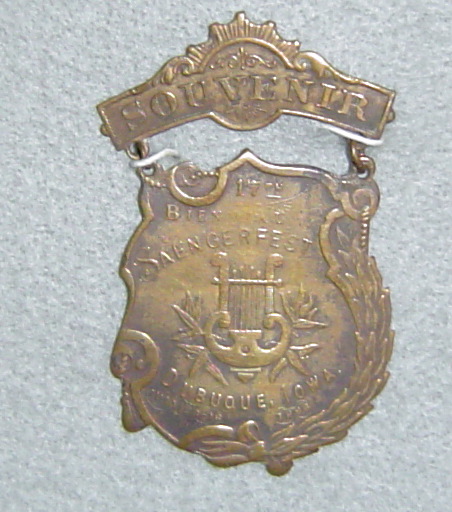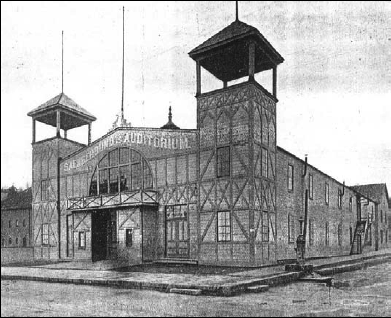Encyclopedia Dubuque
"Encyclopedia Dubuque is the online authority for all things Dubuque, written by the people who know the city best.”
Marshall Cohen—researcher and producer, CNN
Affiliated with the Local History Network of the State Historical Society of Iowa, and the Iowa Museum Association.
DUBUQUE SAENGERBUND: Difference between revisions
No edit summary |
No edit summary |
||
| Line 4: | Line 4: | ||
[[Image:saeaud.png|left|thumb|250px| | [[Image:saeaud.png|left|thumb|250px| | ||
The Saengerbund Auditorium stood at the southeast corner of Kaufmann and Central. Photo courtesy: James E. Jacobsen]]The Saengerbund Auditorium was constructed in 1896. This massive frame hall costing $6,000 housed the “German Day” events of October 16, 1902, described as “the grandest spectacle ever witnessed in Dubuque.” The regional event featured a 13-block long parade. The hall was demolished soon after this event: the operating cost exceeded the resources of the Saengerbund organization. | The Saengerbund Auditorium stood at the southeast corner of Kaufmann and Central. Photo courtesy: James E. Jacobsen]]The Saengerbund Auditorium was constructed in 1896. This massive frame hall costing $6,000 housed the “German Day” events of October 16, 1902, described as “the grandest spectacle ever witnessed in Dubuque.” The regional event featured a 13-block long parade. The hall was demolished soon after this event: the operating cost exceeded the resources of the Saengerbund organization. | ||
[[Image:saebridgefair.png|right|thumb| | [[Image:saebridgefair.png|right|thumb|550px|]] | ||
___ | ___ | ||
Revision as of 15:59, 18 July 2011
DUBUQUE SAENGERBUND. German musical organization of the 1800s. The Saengerbund was formed through the merger of the Dubuque and Helvetia Maennechors on May 1,1879. The former group had been formed on August 8, 1868, while the latter developed during the spring of 1870. The organization focused on vocal excellence. An initiation fee of one dollar was charged with annual dues of three dollars. F. A. Hopple, the director, led practice sessions weekly on Wednesday evenings at DUBUQUE CITY HALL.
The Saengerbund Auditorium was constructed in 1896. This massive frame hall costing $6,000 housed the “German Day” events of October 16, 1902, described as “the grandest spectacle ever witnessed in Dubuque.” The regional event featured a 13-block long parade. The hall was demolished soon after this event: the operating cost exceeded the resources of the Saengerbund organization.
___
Source:
Jacobsen, James E. The Architectural and Historical Resources of Dubuque, Iowa, 1837-1955, p. 7




